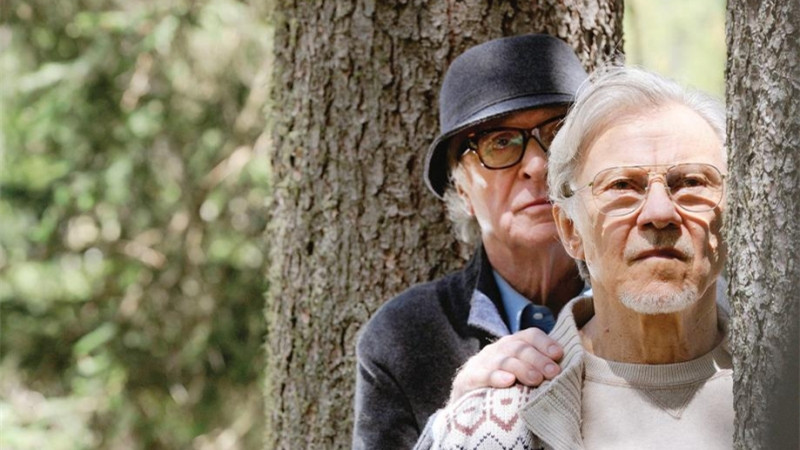
“You’ll learn to appreciate this more as you get older,” is something my father used to say and whenever he did, it would always make me groan. It always seemed like a lame excuse, something to say to young people when they have a dissenting opinion.
Now, my father still has plenty of energy left to bug me with his many wise sayings, but he hasn’t told me this in a long time now. And that’s probably because he knows he doesn’t need to anymore. He knows I’m not a kid anymore. And goddammit, I have to admit, the old man is right.
The same applies for many movies I didn’t get as a kid. I would reject movies because there wasn’t enough action in them, or the pace was too slow or too cynical for my youthful taste. All of this changed when I got older. Now not only do I appreciate films that aren’t action-packed and slow paced and cynical, most of the times I’d even prefer them.
The same applies to many of the movies on this list. Even though I haven’t seen most of these films in my youth, I’d know I wouldn’t be able to understand them like I do now. And that’s because I’m able to look back a few decades. That’s because I’ve seen my neighborhood streets change through time. I’ve seen home entertainment change from videotapes to digital data. I’ve lost people I’ve loved. I’ve had experiences I never thought I had. And for some things of the past, I’m starting to get nostalgic for.
All of these films deal with nostalgia, about our relationships with the past. One character transforms into her teenage self and wonders if she should change the future now that she has the chance. One film shows the terrifying grip of nostalgia and the toll it takes on someone’s mental state. One character’s dream comes true when he inadvertently manages to travel through time and meet his literary heroes.
Two films on this list take place on one specific night, following a set of characters – one features teenagers in the heart of the swinging 1960s, and another features teenagers in the pot-fueled and far more cynical 1970s. One film is specifically designed to fit an era that we now seem to cherish obsessively in pop culture.
One film takes a deep hard look at our nostalgia for a certain time, asking the question of whether or not this specific era was really all that wholesome to begin with. And finally, one film deals with old age, as the past seems so far away and the future seems composed of darkness.
I know that when I get even older, I will probably appreciate these films on an even more grander level. But while I’m still so young – and knowing that this can change in a heartbeat – I’m glad I can appreciate them as well as I can now.
10. Peggy Sue Got Married
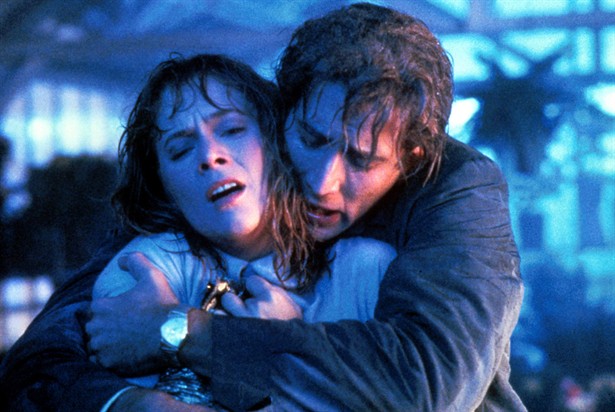
The name Francis Ford Coppola will always be associated with either “The Conversation,” “Apocalypse Now” or “The Godfather.” But he’s made several other gems in his career that are often forgotten about. One of them is the sweet-natured trip down memory lane known as “Peggy Sue Got Married.”
The film opens with a demented Japanese commercial playing on TV starring a very nasal Nicolas Cage – one of the best ways to open a film. As the camera pulls back, we find ourselves in the living room with Peggy Sue (Kathleen Turner) and her daughter Beth (Helen Hunt), who are getting ready to go to Sue’s 25th high school reunion.
But Peggy is not looking forward to this reunion, since she has recently divorced from her husband Charlie (Cage) and this news will likely spawn awkward conversations. But her daughter urges her to go anyway and when she’s there, it’s as uncomfortable as she feared it was.
Worst of all, Charlie makes an appearance even though he promised he wouldn’t. Things take a turn, however, when Peggy and Richard (Barry Miller), a billionaire inventor, are crowned as the reunion’s King and Queen. It’s all glamorous at first until Peggy suddenly faints on stage. When she wakes up again, she finds herself back in her teenage body in the spring of 1960.
Every one of us get to a point where we ask ourselves if we would do things differently, knowing what we know now. Would we use our knowledge of the future for financial profit? Would we pursue different romantic encounters? The film explores this question and the answer, unfortunately, is not that simple. By changing our past, we change our future and this means missing out on the many experiences that made us who we are.
Making different decisions also means there’s room for different mistakes. And sometimes, the way we view the past and the people in them is not necessarily the way things really are. Even the people you thought you knew so well at first might surprise you.
The film asks these questions but it never gets bogged down in dreary existentialism. It’s lighthearted and tender, one could even call it Capraesque. The film spends much of its time celebrating the 1960’s culture. It’s not a deconstruction of the era, like in “Mad Men,” and that’s not a bad thing. There’s no need to explore the darker aspects of the era because this story is viewed through the eyes of Peggy Sue, who naturally perceives the past in all its rose-colored glory.
The film would never have worked without the charms of its star, Kathleen Turner. Her transformation from a bitter adult to a naive teenager is done straight but also with the right amount of good humor. Cage shows his first signs of on-screen madness which you will either love or hate – his nasal voice is both hilarious and grating, and he was reportedly almost fired from the film because of his insistence of using it.
The film is also surrounded by other actors who would become famous later in life such as Jim Carrey, Joan Allen, Helen Hunt and Coppola’s own daughter Sofia – whose acting is just as terrible as ever.
9. Pleasantville
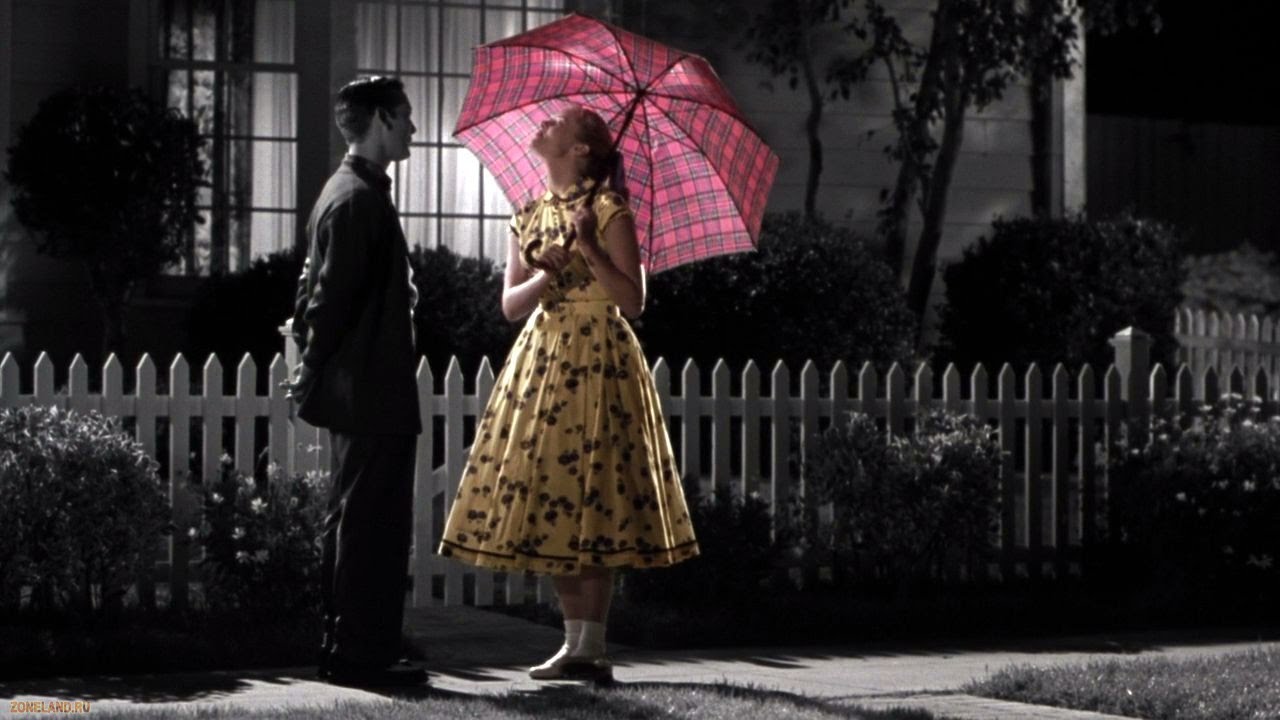
“Pleasantville” is a film that plays with 1950’s nostalgia, but does so in a much more downbeat and ultimately honest way. The film’s opening scenes introduces the eponymous “Pleasantville” as a black-and-white 1950’s TV show about the wholesome adventures of the Parker family in the pleasant town of, you guessed it, Pleasantville.
The conflict of each episode doesn’t get much darker than the kids breaking the neighbors window or finding a stray cat in the gutter – far from the HBO fare we are now accustomed to. The Parker family are unnaturally loving and caring and each mundane conflict is perfectly resolved by the end of each episode.
A show like this would be considered outdated and horribly cheesy by today’s norms, but to a withdrawn teenager like David (Tobey Maguire), whose parents are divorced, “Pleasantville” becomes idyllic escapism.
At school, David endures darkly premonitions from teachers about the future: global warming, famine, economic turmoil. It’s understandable that 1950’s Americana, a much more simpler time at first glance, becomes appealing. One would even wish they could live in the world of Pleasantville…
Well. David gets exactly that chance when he encounters a mysterious repairman (1960’s icon Don Knotts), who gives David a remote control that both transports David and his twin sister Jennifer (Reese Witherspoon) intp the show of “Pleasantville,” where they replace the brother Bud and sister Mary Sue of the Parker family.
Not knowing how to return to the dreary 1990s, the two siblings have no choice but to pretend to be these fictional characters until they can find a way out. But when either David or Jennifer start breaking the rules, such as when Jennifer introduces sex in the world of Pleasantville, literal color starts to break through.
It first happens in the black-and-white surroundings but eventually, as the townspeople start breaking the rules of the universe themselves, even they become colorized.
The film’s premise seems ripe for 1950’s satire and though the film has plenty of this, it takes a much more meaningful turn when it starts to explore the dystopian nature of 1950’s suburbia.
The film’s premise eventually becomes a metaphor for the sexual revolution, with the rise of individualism and the questioning of social norms. The conservative townspeople who are uncomfortable with these changes start to fight back, giving rise to prejudice (with the black-and-white townspeople harassing the ‘colored’ people of Pleasantville), book burnings and even violent riots.
The town’s mayor Big Bob (the final performance of the late great J.T. Walsh) introduces a ‘code of conduct’ that everyone in Pleasantville must adhere to. These codes of conduct all harp back to traditional values as well as forbidding certain types of music and art. When Big Bob takes dissenters to court for breaking the rules, we even see a big brother-like logo in the back of the courtroom, which further indicates the fascist nature of the family values ethos.
But as we can clearly see with each character who discovers their individuality, once you’ve tread into the abyss, there’s no going back. When Bill Johnson (Jeff Daniels), the local owner of a burger joint, gives into his artistic desires, he cannot comprehend his life without it.
When Betty Parker (a wonderful Joan Allen) acknowledges her feelings for Bill and her need for sexual gratification, there’s no going back for her. All of these changes understandably bring panic to the community, such as George Parker (William H. Macy), who is shocked and appalled when he comes home and discovers that dinner isn’t ready for him.
But George’s grief goes far deeper than losing an obedient wife at home: it’s about him losing the comfortable predictability of life. It’s the frightening prospect that none of us know what the future holds for us.
But we all have to live in this world. If we all mindlessly conform like how the people of Pleasantville used to do, we will sacrifice something precious in return. We will exclude others who can’t conform into this world while many others have to suppress their nature in order to keep the balance intact.
We have to remember that in every supposed golden age, some groups were always left out. And so we have to live in the real world, no matter how scary it is. We have to be ourselves even if it means defiance from the world around us. Our freedom means uncertainty. None of us know what the future will hold and sometimes things look decidedly bleak, but there’s beauty and hope as well. We just have to be brave enough to see it.
8. Turbo Kid
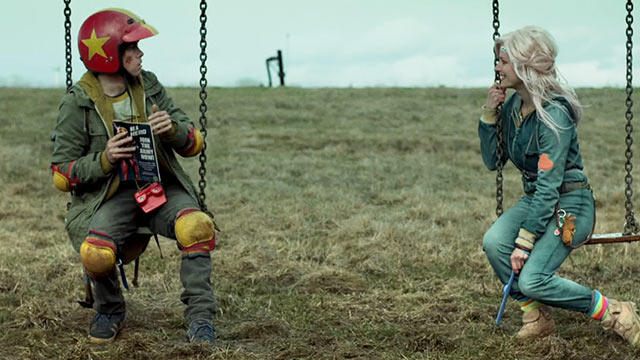
Comparatively, “Turbo Kid” might look like the black sheep of this article. But if you think about it hard enough, you will realize that “Turbo Kid” is a film that lives and breathes on nostalgia – though, perhaps, not the kind that most will adhere to. If you aren’t a fan of post-apocalyptic films or practical gore effects, you’re not going to enjoy this. But if you happen to adore these things, like I do, you’re going to have one helluva time.
In the far future of 1997, the world looks even worse than it does in John Carpenter’s “Escape from New York.” The world, now referred to as ‘The Wasteland’, is ruled by Zeus (a deliciously hammy Michael Ironside) who controls the world’s water supplies and is protected by a gang of bike-wielding and buzz-sawing psychopaths.
A young scavenger, known as The Kid (Munro Chambers), encounters a young girl named Apple (an adorable Laurence Leboeuf) who seems quite desperate for his friendship. At first he wants to get rid of her, but as you can expect, he eventually falls for her charms. But it isn’t long before she is kidnapped by Zeus’ gang and the Kid finds himself all alone again.
Through a stroke of magnificent luck, The Kid finds an abandoned spaceship where inside lies the body of its former owner: a superhero named Turbo Rider. The Kid dons the Turbo Rider armor suit and the laser blaster that comes with it, and becomes the superhero known as the Turbo Kid. Together with a cowboy named Frederick (Aaron Jeffery), the Turbo Kid heads off to save Apple and stop the evil warlord Zeus.
Nostalgia for the 1980s has become commercialized now, thanks in part by the popularity of “Stranger Things.” The upcoming Steven Spielberg film “Ready Player One” seems specifically designed to pander on our nostalgia for 80’s cheese. But “Turbo Kid” is not a soulless nostalgia piece that thrives on references from past films – and came years before “Stranger Things,” I might add – but a genuinely heartfelt ode to the era that can also stand perfectly well on its own.
The film was directed by three very passionate filmmakers: François Simard, Anouk Whissell and Yoann-Karl Whissell. The three of them bring the exact right ingredients on screen to make this film work: from practical gore, to a totally bitchin’ 80’s synth score by Le Matos and most important of all, the wonderful chemistry between The Kid and Apple.
If we didn’t care about the main characters, if it didn’t have that beating heart at the center, this film could have been nothing more than a enjoyable retro picture. But because we actually do care about the characters, the film becomes much more meaningful.
7. Dazed and Confused
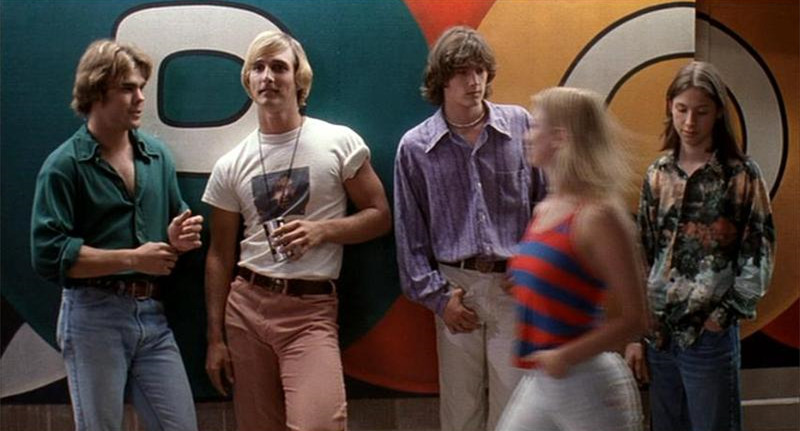
All right, all right, all right! “Dazed and Confused,” man! That movie is totally awesome. While watching it, you don’t have to think too much, you know? It’s just a day in the life of several teenagers as they beautifully waste their time by driving around, drinking beers, smoking reefer, trying to get laid, or in some cases, trying to paddle freshman boys… and that’s it. Right?
Well, no. As with most Richard Linklater films, there’s a darker truth hiding beneath the lightheartedness on screen. After viewing this film more than a few times, you start to realize that many of these teenagers are quite aware, even frightened, about the fleeting and destructive nature of time. They’ve seen examples of how time can change people.
How time can turn your best friend into a stranger. How the love of your life can one day be just another old flame. How those who seem so cool in high school can seem rather pathetic later in life – as will likely be the case with Wooderson (Matthew McConaughey), as his pursuit for freshman girls will eventually be perceived as a tired joke (and a rather creepy one).
Just because you were the most popular kid in high school doesn’t mean you are going to make it in life. You’ll realize soon enough that the movies have lied to you. Life doesn’t have a three-act structure. You may find yourself stuck in the second act until you reach middle-age. If you aren’t born rich, you will probably never be rich. There’s a millions of suckers like you out there and there is only so little space. It’s luck. Everything thrives on luck just as much as hard work.
The prospect of failure is always there. If you want to make something of yourself, you have to follow the rules. You can be rebellious like Wooderson who so memorably proclaimed in “Dazed in Confused” that, “The older you do get the more rules they’re gonna try to get you to follow.
You just gotta keep livin’ man, L-I-V-I-N.” But most of us don’t get anywhere without following the rules. Most of us simply can’t afford it. It might be so easy to say “fuck you” when you’re young, but when you’re older, it’s time to grow the fuck up.
And then there’s the question whether things will get any better after high school. In “Dazed and Confused,” some of the teenagers come to the frightening realization that these high school years could turn out to be the best times of their lives. And they can’t stand it. As Randall ”Pink” Floyd (Jason London) mournfully states, “….If I ever start referring to these as the best years of my life, remind me to kill myself.”
The saddest thing is that some of them will probably forget how precious these moments really were. For we all know that youth is wasted on the young. As Cynthia (Marissa Ribisi) says in the film, “After a couple of years, no one will even remember.”
All of these moments of awareness come in bursts, through the haze of a marijuana smoke, in drunken stupors, while gazing at the stars, or when their guards are down and they feel comfortable enough to reveal themselves fully with people they call their friends. All of these moments are destined to fade away. The sun is always ready to go down.
Richard Linklater is a filmmaker who always seems to be fascinated with our relationship with the past. Many of his films either take place in specific time periods or feature characters reminiscing about the past.
This article could easily be filled with many more of this films – such as the Before Trilogy; the spiritual sequel of “Dazed and Confused,” “Everybody Wants Some”; and his latest excellent film, “Last Flag Flying” (which is in turn a spiritual sequel to Hal Ashby’s “The Last Detail”).
But if there’s one truth spoken in “Dazed and Confused,” one that lives in every moment of our lives, it’s this one: “…Quit thinking of the present, like right now, as some minor, insignificant preamble to something else.”
This moment is all we have. Use it wisely. Start L.I.V.I.N.”
6. Radio Days

So many precious memories go to waste. Not everyone is able to get their story told. Not everyone is interested in writing their memoirs. And though not everyone lives akin to the greats of history, these memories are precious nonetheless because when these people pass on, the worlds they lived in will pass on, too.
And the less information we have about the world before us, the less we will understand about the past. And the less we understand about the past, the less we will understand about ourselves.
“Radio Days,” one of Woody Allen’s lesser known and often forgotten work, is a film about the preciousness and fragility of memories. It’s unlike most of his other films in that it doesn’t revolve around the neurotic follies of romantic relationships. There’s no real story. It’s just the scrambled reminiscence of the narrator Joe (Allen) as he recounts his youth from the late 1930s to the mid-1940s.
Thus, it’s filled with innocence – but with the little wickedness that comes with being a child. We are introduced to his bickering but ultimately loving family, who speak to each other in Allen’s delicious misanthropic wit. It’s a wacky slice of life. It’s a depiction of a time and place that has forever disappeared.
A strange time when people weren’t glued to their LCD screens but received their entertainment through the radio and in each other’s company. It might be a little romanticized, as the narrator states, but he can’t help that. This is just how he remembers it.
It’s about the radio stories he heard in that time. The characters that crept in his imagination. Time scrambles our memories, so Joe isn’t entirely sure whether some radio stories ended this way or that; in one instance of the film, he even depicts several endings. Families would huddle amongst each other listening to the radio.
In the film’s most touching moments, they would even cry with each other when the radio entailed some particularly sad news. Now we are bombarded with sad news and we carry on anyway.
Things were so much simpler then. Not necessarily better but simpler. But just like the worlds before it, eventually it had to disappear. We can find remnants of this world in our museums and in history books, and as long as people who lived in those old worlds are still alive, we can hear about them.
But not many people who lived in those radio days are left. As the Masked Avenger (Wallace Shawn), the voice of a popular radio show says, “After enough time, everything passes. I don’t care how big we are or how important are our lives.” And as time passes, we wonder what it’s all about – if it was even about anything. And all of those voices, no matter how important they were to us, will grow dimmer and dimmer as more time passes.
But as long we have films like “Radio Days,” these voices live on. It might not be their actual voices, and Allen’s memories (as this film is slightly autobiographical) might not be entirely accurate (by his own admission), but it’s the best we have. And I’m sure that these people from long-gone worlds are happy about how Allen remembers them.